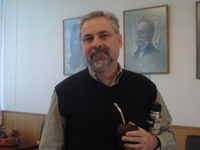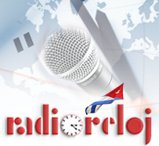Author and coauthor of referential titles for communication production including Comunicación popular: ¿diálogo o monólogo? (Aportes, Montevideo 1994), y Comunicación, cultura y política (Calandria-CEAAL, Lima 1997), Gabriel today sees a singular moment of social dialogue in the continent, which ” is re-emerging, rather than emerging, something you might call a paradigm, communication with different models and, especially, different possibilities.”
For the also professor of Communication Sciences at the Universidad de la República Oriental del Uruguay, as his father Mario used to describe: ” the radio excites.” That is one of the cores of much enjoyment, that one that allows Gabriel Kaplún to put the sound spell on stage and examine its current paths.
”The radio will remain essential to cover present day in each region of the world and in each country, in real time and enable young people to find their ‘favorite musical color’.” ( Hervé Bourges).
– In the communication scenario that is set in Latin America, what are the challenges for the radio speech from Gabriel Kaplún’s passionate glass?
“I think there is a political challenge, a technological challenge and a language challenge. The political challenge has to do with the renewal of all the media within the perspective been drawn in Latin America as the perspective of three sectors: the perspective of community, public and commercial media.
“The technological challenge is to understand the radio in the context of technological change, understand its relationship with other media and Internet, and I think that in the midst of it all there is a challenge of language; will the radio use the same language?
 ” The Radio is narration, how it recounts in a context of connection with other media, we would have to think if what the Radio tells is in line with the stories published in Facebook, with the messages listeners post in their accounts, write in their emails or post in their blogs. But there is also a language challenge we have yet to realize, we’ll have to think why the radio used to boost imagination, and whether there is imagination circulating in internet, there are a lot of things to take into consideration, we don’t know too much about this but there are experiences everywhere that show us the way.
” The Radio is narration, how it recounts in a context of connection with other media, we would have to think if what the Radio tells is in line with the stories published in Facebook, with the messages listeners post in their accounts, write in their emails or post in their blogs. But there is also a language challenge we have yet to realize, we’ll have to think why the radio used to boost imagination, and whether there is imagination circulating in internet, there are a lot of things to take into consideration, we don’t know too much about this but there are experiences everywhere that show us the way.
While writing the script, the radio educator should be constantlywondering: Will I still be listening to this point? Will I be managing to keep the interest of mymy audience or have they turned the dial? (Mario Kaplun ).
– How do you think the radio on the continent will remain faithful to the community in the midst of the global age?
“The Latin American experience of community radio has many contrasts. There are many strengths and weaknesses, but we have learned some lessons in the last few years. I think there is a key that has to do with understanding first that the community is more than the local; that community is usually common, but common is usually is built.
“The community has to do with management. In other words, a community radio has to do basically with the way it is managed in the broad sense of the word. I do not just mean the daily management, whether I put this equipment there, whether we make this purchase, that’s management also, but I mean especially decision making: the editorial decisions, the programming, which generate mechanisms for broader participation. “
– In your opinion what is the significance in the social development of our people’s citizen participation?
“Social participation has something to say in all development processes, but it is a pity if it doesn’t have it because they are going to be economic development processes but they are not going to be deep processes of development, maybe even do more harm than good our societies.
“Today a lot is spoken in Latin America about looking for a new concept of development. Some prefer to speak of good living rather than development. Do we actually live better now, when there are certain processes that destroy the environment? , Is that living better? … Yes, maybe they consume more, maybe there is some work to more people, but the price is very expensive for our societies. When societies involved in these things, prevents them, social participation is a key to development well understood, or as some say, of the good living.
“Radio has the duty to enforce the, participatory, real democratic culture to stimulate intelligence and sensitivity to nurture critical consciousness … ” ( Miguel Barnet )
– How much can Cuba bring to the draft of dialogic communication and democratization taking hold in Latin America in the 21st century?
“I think Cuba can bring a lot because Cuba is exceptional in the sense of its social fabric. Since the triumph of the Revolution, Cuba has the tradition of reaching every citizen, every corner, every family house, and that is rare elsewhere.
“It’s an organizational tradition of more than half a century, which can give a lot. I think it can contribute a lot in this project because it just has very strong representation mechanisms and a draft of citizen construction that is relevant in its revolutionary history.
“It is true that the traditions must be given a new life because they are of not use if we simply carve them in marble, however; Cuba has that prior wealth, those solid roots that always help.”
See also:
• The radio from the passionate prism of Gabriel Kaplun ( I)
Traslated by Daysi Olamo
Revised by ESTI



